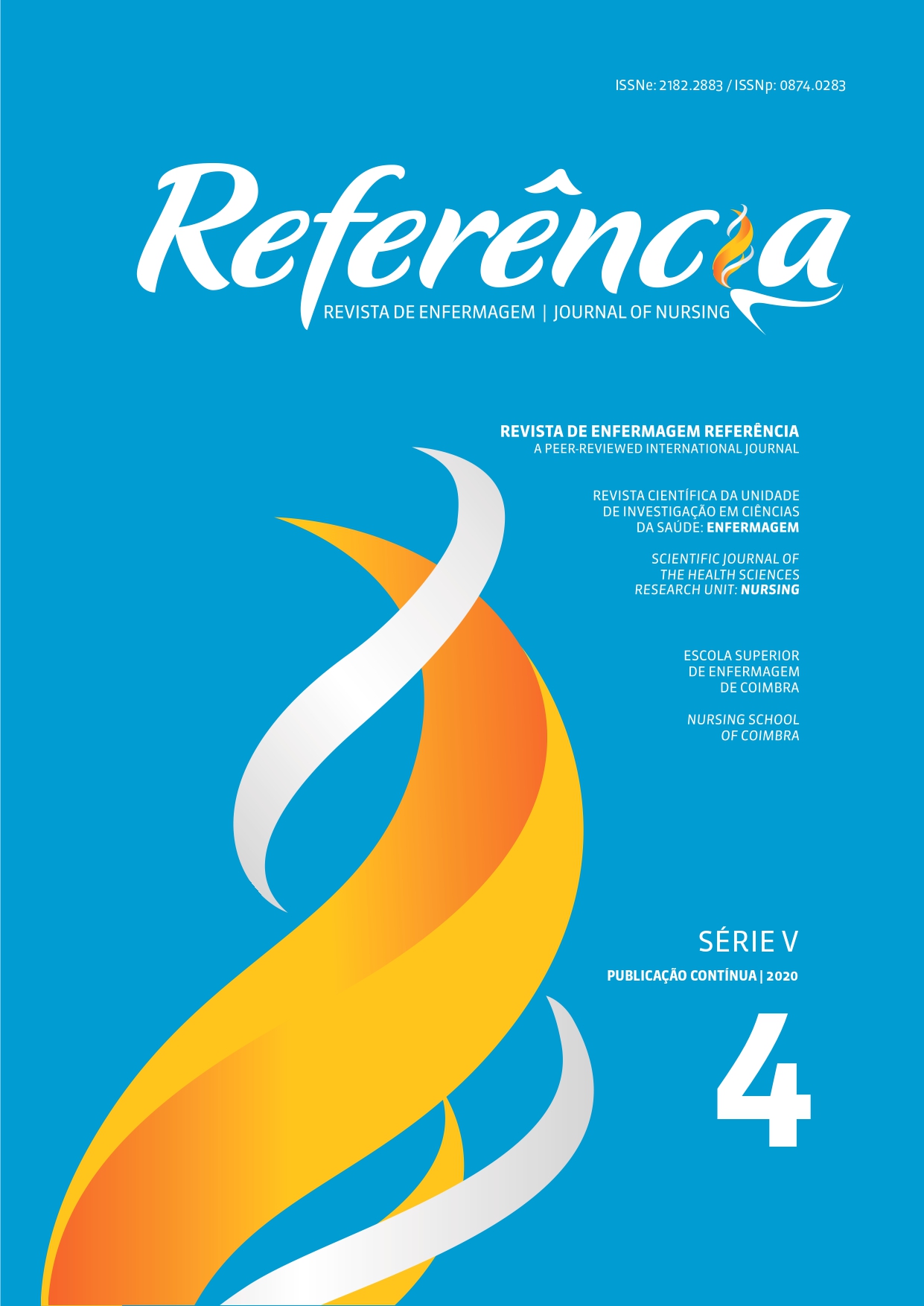Adaptação transcultural brasileira do Resilience Safety Culture
DOI:
https://doi.org/10.12707/RV20065Palavras-chave:
cultura organizacional, estudo de validação, psicometria, tradução, análise fatorialResumo
Enquadramento: Nos sistemas de saúde, a resiliência institucional refere-se à adaptação dos trabalhadores, de forma a preservar a relação saudável entre a pessoa e o seu trabalho num ambiente com considerável transformação e imprevisibilidade.
Objetivo: Realizar a adaptação transcultural da Resilience Safety Culture para o Brasil e para as organizações de saúde.
Metodologia: Estudo metodológico, cujo processo de adaptação e validação seguiu 6 etapas. O instrumento foi aplicado a 145 profissionais de saúde num hospital público.
Resultados: Na adaptação cultural, os itens foram ajustados conforme análise dos juízes com coeficiente global de validade de conteúdo de 0,95 e consistência interna dos itens 0,91. A análise fatorial
confirmatória sugeriu um modelo com índices adequados (X2/dl = 5,315; SRMR = 0,079; TLI = 0,92;
CFI = 0,93; RMSEA = 0,019).
Conclusão: A versão brasileira foi considerada válida e confiável, com 42 itens dispostos em 10 domínios,
divergindo do modelo original. Recomenda-se que a versão adaptada seja utilizada em outras amostras, a fim de averiguar a sua validade e confiabilidade alcançadas neste estudo.
Downloads
Referências
Alexandre, N. M., & Coluci, M. Z. (2011). Validade de conteúdo nos processos de construcao e adaptacao de instrumentos de medidas. Ciência & Saúde Coletiva, 16(7), 3061-3067. doi:10.1590/S1413-81232011000800006
Arthur, J. P., Mantovani, M. F., Ferraz, M. I., Mattei, A. T., Kalinke, L. P., & Corpolato, R. C. (2018). Translation and cross-cultural adaptation of the hypertension knowledge-level scale for use in Brazil. Revista Latino Americana de Enfermagem, 26, e3073. doi:10.1590/1518-8345.2832.3073
Beaton, D. E., Bombadier, C., Guilemin, F., & Ferraz, M. B. (2000). Guidelines for the process of cross-cultural adaptation of self-report measures. Spine, 25(24), 3186-3191. doi:10.1097/00007632-200012150-00014
Braithwaite, J., Hollnagel, E., & Hunte, G. S. (2919). Working across boundaries: Resilient health care. New York, NY: Taylor & Francis.Agencia Nacional de Vigilancia Sanitaria. (2014). Documento de referência para o programa nacional de: Segurança do paciente. Recuperado de https://bvsms.saude.gov.br/bvs/publicacoes/documento_referencia_programa_nacional_seguranca.pdf
Costa, C. M., Chagas, H. M., Matsukura, T. S., Vieira, G. I., Marqueze, E. C., Lopez C. G., & Lefevre, F. (2014). Contributions of a graduate program in the health field for professional education: Experience report. Saúde e Sociedade, 23(4), 1471-1481. doi:10.1590/S0104-12902014000400028
Coze, J. C. (2019). Resilience, reliability, safety: Multilevel research challenges. In S. Wiig & B. Fahlbruch (Eds.), Exploring resilience: A scientific journey from practice to theory (pp. 7-13). doi:10.1007/978-3-030-03189-3
Goncalves, A. M., Arciprete, A. P., Barroso, T. M., & Pillon, S. C. (2018). Adaptacao transcultural e validacao do drug and drug problems perceptions questionnaire para o contexto brasileiro. Revista de Enfermagem Referência, 4(19), 11-19. doi:10.12707/RIV18014
Hair, J. R., William, B., Babin, B., & Anderson, R. E. (2009). Análise multivariada de dados (6a ed.). Porto Alegre, Brasil: Bookman.
Lynn, M. R. (1986). Determination and quantification of content validity. Nursing Research, 35(6), 382-385.
Machado, L. C., & Neiva, E. R (2017). Praticas de gestao da mudanca: Impacto nas atitudes e nos resultados percebidos. Revista Psicologia Organização e Trabalho, 17(1), 22-29. doi:10.17652/rpot/2017.1.12157
Marinho, G. l, Paz, E. P., Jomar, R. T, & Abreu, A. M. (2019). Enfermeiros no Brasil: Transformacoes socioeconomicas no inicio do século XX. Escola Anna Nery, 23(1), e20180198. doi:10.1590/2177-9465-ean-2018-0198
Medeiros, R. K., Junior, M. A., Pinto, D. P., Vitor, A. F., Santos, V. E., & Barichello, E. (2015). Pasquali’s model of content validation in the nursing researches. Revista de Enfermagem Referência, 4(4), 127-135. doi:10.12707/riv14009
Shirali, G., Shekari, M., & Angali, K. A. (2018). Assessing reliability and validity of an instrument for measuring resilience safety culture in sociotechnical systems. Safety and Health at Work, 9(3), 296-307. doi:10.1016/j.shaw.2017.07.010
Stacciarini, T. S., & Pace, A. E. (2017). Confirmatory factor analysis of the appraisal of self-care agency scale: Revised. Revista Latino Americana de Enfermagem, 25, e2856. doi:10.1590/1518-8345.1378.2856
Souza, A. C., Alexandre, N. M., & Guirardello, E. B. (2017). Psychometric properties in instruments evaluation of reliability and validity. Epidemiologia e Serviços de Saúde, 26(3), 649–659. doi:10.5123/S1679-49742017000300022
Taber, K. S. (2018). The use of Cronbach’s alpha when developing and reporting research instruments in science education. Research in Science Education, 48, 1273–1296. doi:10.1007/s11165-016-9602-2
Tjoflåt, I., & Hansen, B. S (2019). Building resilience in humanitarian hospital programs during protracted conflicts: Opportunities and limitations. In S. Wiig & B. Fahlbruch (Eds.), Exploring resilience: A scientific journey from practice to theory (pp. 97-104). doi:10.1007/978-3-030-03189-3
World Health Organization. (2009). The conceptual framework for the international classification for patient safety: Final technical report. Recuperado de https://www.who.int/patientsafety/taxonomy/icps_full_report.pdf
Zambardi, J. M., Lopes, C. T., Morais, S. C., Newhouse, R. P., Lopes, J. L., & Barros, A. L. (2019). Adaptacao transcultural para o Brasil e confiabilidade da smoking cessation counseling. Acta Paulista de Enfermagem, 32(3), 290-297. doi:10.1590/1982-0194201900040

















